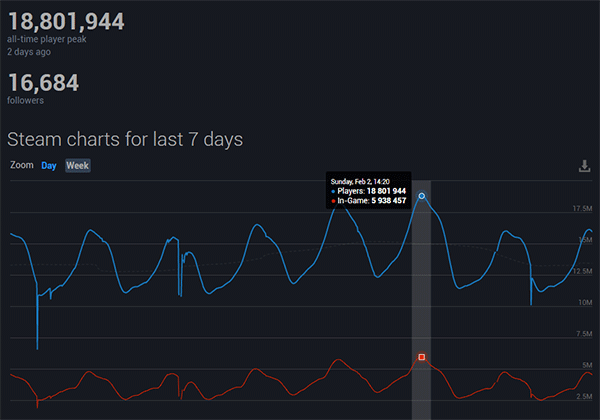Steam set a new record for concurrent online users this past Sunday when it crossed the 18.5 million peak the platform hit two years ago.
The new milestone, an all-time user peak of 18,801,944, was brought to attention by the official @SteamDB twitter account.

The announcement also mentions that while the peak count was higher on the day than it was when the previous record was set, the number of active users were actually lower in comparison. The difference was roughly 1.2 million, with 5.9 million players in-game on Sunday (5.8 million when the record was announced) versus 7 million on the day of the previous record.
Steam has broken its record for most concurrently online users that was held for two years. Previous record was 18,537,490 users. It’s still increasing!
But there’s about 1 million less players actually in-game (≈5.8mil vs ≈7mil two years ago).
Even with competition from the likes of the Epic Games Store and EA’s Origin, Steam continues to dominate the PC game distribution space in terms of sheer numbers.
While much of this count may be attributed to Steam clients launching on system startup, having nearly 6 million players in-game simultaneously isn’t a mean feat either. At the time the old record was broken, the usual mix of games stood at the top of the concurrent user chart, with Counter-Strike: Global Offensive, Dota 2, PlayerUnknown’s Battlegrounds, Grand Theft Auto V, Monster Hunter: World, and Tom Clancy’s Rainbow Six Siege leading the pack.
With EA and Valve joining hands to gradually bring Origin titles, including the extremely popular Apex Legends, to Steam over the course of 2020, the latter’s numbers may see further improvement. Then there’s the slew of big names the likes of Cyberpunk 2077 and Dying Light 2 coming to the platform toward the end of the year.

You may also like to check out:
- Checkra1n For Windows Alternative: How To Use Ra1nUSB For iOS 13.3 Jailbreak
- Download: iOS 13.3.1 Final IPSW Links, OTA Update And iPadOS 13.3.1 Released For Compatible Devices
- Downgrade iOS 13.3.1 To iOS 13.3 For Checkra1n Jailbreak, Here’s How
- Jailbreak iOS 13.3 Using Checkra1n, Here’s How [Guide]
- Jailbreak iOS 13.3 / 13.3.1 On iPhone 11, 11 Pro Max, XS, More With New tfp0 Exploit Will Be Possible Soon
- iOS 13 / 13.2.2 Jailbreak Tweaks Compatibility List For Checkra1n
- Apple Watch ECG App Hack: Enable Outside US In Unsupported Country On Series 5 & 4 Without Jailbreak
You can follow us on Twitter, or Instagram, and even like our Facebook page to keep yourself updated on all the latest from Microsoft, Google, Apple, and the Web.

